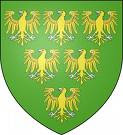Happy New Year! Time for me to reflect on some of the best books I've read in 2012. Sadly, there were no new non-fiction/fiction books revolving around Piers Gaveston - and very little on Edward II. Dan Jones' 'The Plantagenets' proved a huge disappointment. So, in no particular order, here are what I consider to be the best reads of 2012.
1. 'Blood Sisters' by Sarah Gristwood, which tells the stories of the women involved in the 'Wars of the Roses'. I really enjoyed this book, in particularly the stories of Cecily, Duchess of York, Elizabeth Woodville, Margaret Beaufort and Elizabeth of York. These women suffered such tragedy in their lives, in particular Elizabeth Woodville, but they were resilient and I have to admire their strength in carrying on with their lives and ensuring the survival of their families.
2. ' Elizabeth of York - Queenship and Power', by Arlene Naylor Okerlund. This was a great read with lots of details about Elizabeth's complicated life and the uncertainty she encountered. It also portrays a happy marriage with Henry VII. Of particular interest was Elizabeth's personal household accounts which shows her charitable interests.
3. 'Her Highness the Traitor', by Susan Higginbotham. One of those books that once you start, you can't put down. A sympathetic and warm portrayal of Frances Grey, the mother of lady Jane Grey and Jane Dudley, the wife of the Duke of Northumberland. Very little has been written about Jane Dudley in fiction/non-fiction, and she emerges as a gentle, family-orientated woman who enjoyed a happy marriage and who showed great humility and courage in pleading of the lives of her family.
4. 'Song of Achilles' by Madeline Miller. OK, this book started out really well, telling the story of Achilles through his lover Patroclus. However, after about three quarters through, it seemed to lose it's way and I had to force myself to finish it.
5.
Notices of the Historic Persons Buried in the Chapel of St.
Peter Ad Vincula in the Tower of London (1877) by Doyne Courtenay Bell. A gem of a book based on the project carried out in Queen Victoria's reign. The chapel of St. Peter ad Vincula is the chapel in the Tower of London which is the burial place of some of the most important victims of the Tudor period. The chapel had begun to decay and fall into disrepair, and Queen Victoria ordered it to be repaired, and that as the floor of the chapel was in such a bad way, it be lifted, and those remains which could be identified were to be re-buried appropriately. The book details the remains found and how some of them were identified, and how the authors came to the conclusions they did.
6. 'Bring Up the Bodies' by Hilary Mantel. Continuing the story of Thomas Cromwell. Even though I am pro-Boleyn, I really enjoy this portrayal of Thomas Cromwell. The big flaw for me, however, were Cromwell's reasons for selecting the victims to bring down Anne Boleyn.


